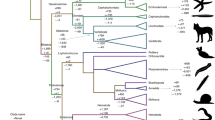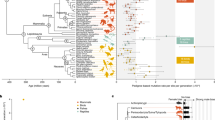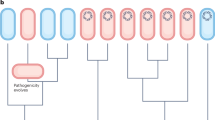Abstract
Although positive selection has been detected in many genes, its overall contribution to protein evolution is debatable1. If the bulk of molecular evolution is neutral, then the ratio of amino-acid (A) to synonymous (S) polymorphism should, on average, equal that of divergence2. A comparison of the A/S ratio of polymorphism in Drosophila melanogaster with that of divergence from Drosophila simulans shows that the A/S ratio of divergence is twice as high—a difference that is often attributed to positive selection. But an increase in selective constraint owing to an increase in effective population size could also explain this observation, and, if so, all genes should be affected similarly. Here we show that the difference between polymorphism and divergence is limited to only a fraction of the genes, which are also evolving more rapidly, and this implies that positive selection is responsible. A higher A/S ratio of divergence than of polymorphism is also observed in other species, which suggests a rate of adaptive evolution that is far higher than permitted by the neutral theory of molecular evolution.
This is a preview of subscription content, access via your institution
Access options
Subscribe to this journal
Receive 51 print issues and online access
$199.00 per year
only $3.90 per issue
Buy this article
- Purchase on SpringerLink
- Instant access to full article PDF
Prices may be subject to local taxes which are calculated during checkout

Similar content being viewed by others
References
Nei, M. Molecular Evolutionary Genetics (Columbia Univ. Press, New York, 1987).
McDonald, J. H. & Kreitman, M. Adaptive protein evolution at the Adh locus in Drosophila. Nature 351, 652–654 (1991).
Kimura, M. The Neutral Theory of Molecular Evolution (Cambridge Univ. Press, Cambridge, 1983).
Fay, J. C., Wyckoff, G. J. & Wu, C.-I. Positive and negative selection on the human genome. Genetics 158, 1227–1234 (2001).
Kimura, M. Preponderance of synonymous changes as evidence for the neutral theory of molecular evolution. Nature 267, 275–276 (1977).
Yang, Z. & Bielawski, J. P. Statistical methods for detecting molecular adaptation. Trends Ecol. Evol. 15, 496–503 (2000).
Wyckoff, G. J., Wang, W. & Wu, C.-I. Rapid evolution of male reproductive genes in the descent of man. Nature 403, 304–309 (2000).
Weinreich, D. M. & Rand, D. M. Contrasting patterns of nonneutral evolution in proteins encoded in nuclear and mitochondrial genomes. Genetics 156, 385–399 (2000).
Moriyama, E. N. & Powell, J. R. Intraspecific nuclear DNA variation in Drosophila. Mol. Biol. Evol. 13, 261–277 (1996).
Eanes, W. F., Kirchner, M. & Yoon, J. Evidence for adaptive evolution of the G6pd gene in the Drosophila melanogaster and Drosophila simulans lineages. Proc. Natl Acad. Sci. USA 90, 7475–7479 (1993).
Begun, D. J. & Whitley, P. Adaptive evolution of relish, a Drosophila NF-κB/IκB protein. Genetics 154, 1231–1238 (2000).
Tsaur, S. C., Ting, C. T. & Wu, C. I. Positive selection driving the evolution of a gene of male reproduction, Acp26Aa, of Drosophila: II. Divergence versus polymorphism. Mol. Biol. Evol. 15, 1040–1046 (1998).
Langley, C. H. & Fitch, W. M. An examination of the constancy of the rate of molecular evolution. J. Mol. Evol. 3, 161–177 (1974).
Ohta, T. Synonymous and nonsynonymous substitutions in mammalian genes and the nearly neutral theory. J. Mol. Evol. 40, 56–63 (1995).
Lachaise, D. M., Cariou, M.-L., David, J. R., Lemeunier, F. & Tsacas, L. The origin and dispersal of the Drosophila melanogaster subgroup: a speculative paleogeographic essay. Evol. Biol. 22, 159–225 (1988).
Andolfatto, P. Contrasting patterns of X-linked and autosomal nucleotide variation in Drosophila melanogaster and Drosophila simulans. Mol. Biol. Evol. 18, 279–290 (2001).
Akashi, H. Codon bias evolution in Drosophila: Population genetics of mutation-selection drift. Gene 205, 269–278 (1997).
McVean, G. A., Vieira, J. Inferring parameters of mutation, selection and demography from patterns of synonymous site evolution in Drosophila. Genetics 157, 245–257 (2001).
Kliman, R. M. et al. The population genetics of the origin and divergence of the Drosophila simulans complex species. Genetics 156, 1913–1931 (2000).
Begun, D. J. The frequency distribution of nucleotide variation in Drosophila simulans. Mol. Biol. Evol. 18, 1343–1352 (2001).
Ohta, T. Slightly deleterious mutant substitutions during evolution. Nature 246, 96–98 (1973).
Hey, J. & Wakeley, J. A coalescent estimator of the population recombination rate. Genetics 145, 833–846 (1997).
Rozas, J. & Rozas, R. DnaSP version 3: an integrated program for molecular population genetics and molecular evolution analysis. Bioinformatics 15, 174–175 (1999).
Acknowledgements
This work was supported by grants from the NIH and NSF to C.-I.W. and a Genetics Training Grant and a Department of Education PhD fellowship to J.C.F.
Author information
Authors and Affiliations
Corresponding author
Ethics declarations
Competing interests
The authors declare no competing financial interests.
Supplementary information
Rights and permissions
About this article
Cite this article
Fay, J., Wyckoff, G. & Wu, CI. Testing the neutral theory of molecular evolution with genomic data from Drosophila. Nature 415, 1024–1026 (2002). https://doi.org/10.1038/4151024a
Received:
Accepted:
Issue Date:
DOI: https://doi.org/10.1038/4151024a



